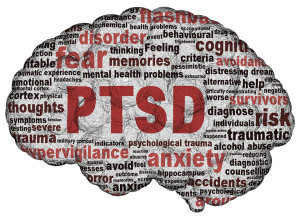As Post-Traumatic Stress Disorder (PTSD) comes into sharp focus in our national consciousness, a picture of its devastating effects is emerging. Although only 8% of the U.S. population has PTSD in a given calendar year, that roughly translates into nearly 25 million people who struggle with the symptoms of PTSD.
PTSD is caused by witnessing or being involved in a traumatic event, such as war, rape, violent crime, or prolonged expsore to repeated stress, and is characterized by the following attributes:
- Recurrent, involuntary, and intrusive distressing memories of the traumatic event(s).
- Recurrent distressing dreams in which the content and/or affect of the dream are related to the traumatic event(s).
- Dissociative reactions (e.g., flashbacks) in which the individual feels or acts as if the traumatic event(s) were recurring. (Such reactions may occur on a continuum, with the most extreme expression being a complete loss of awareness of present surroundings.)
- Intense or prolonged psychological distress at exposure to internal or external cues that symbolize or resemble an aspect of the traumatic event(s).
- Marked psychological reactions to internal or external cues that symbolize or resemble an aspect of the traumatic event(s).

Medications, primarily the use of antidepressants, have produced mixed results at best. Recent research on combat veterans diagnosed with PTSD found that “. . . although SSRIs are associated with an overall response rate of approximately 60% in patients with PTSD, only 20% to 30% of patients achieve complete remission. In two clinical studies of PTSD, sertraline was significantly more effective than placebo, according to several efficacy measures, including the Clinician-Administered PTSD Scale, Part 2 (CAPS-2). In two additional studies, however, the difference in response to treatment between patients receiving sertraline and patients receiving placebo was not statistically significant.”
Moreover, antidepressants often have negative side-affect profiles, including but not limited to “sexual dysfunction, weight gain, and sleep disturbance,” according to a study published in the National Institutes of Health. Even when helpful, patients often discontinue taking antidepressants because while the potential benefits are long-term in nature (it often takes several weeks to months to find an appropriate medication and dose), the unpleasantness of the side effects are often immediate.
As Joel L. Young, M.D., the Medical Director of the Rochester Center for Behavioral Medicine states, ”Side effects tend to come before positive benefits of a medication. A depressed patient, for example, might experience sexual dysfunction within a few days of taking medication. Over time, this effect often dissipates, but many patients stop taking their medication before this has a chance to happen.”
Psychotherapy is also helpful for people suffering from PTSD. In fact, research indicates that this approach may be better than the medication only route. Specifically, a recent Harvard University review of psychiatric literature found “. . . the benefits of psychotherapeutic approaches lasted longer [than medication alone] and that “patients with PTSD who received psychotherapy had significantly greater improvement in symptoms compared with those who received only medications.” The study also concluded that “ . . .combining both therapy and medications was significantly better in the long term than medications alone.”
However, this type of intervention is costly and timely, causing patients to forego treatments. In a study that talked about the therapeutic relationship and psychotherapy outcome cited by therapist Gracie Lu, LCSW, Lu claims that “. . . 20 to 57 percent of people in therapy do not return after the initial session (Lambert)” while “37 to 45 percent only attend therapy a total of two times (Schwartz).” And because PTSD often causes avoidance behaviors, therapeutic compliance is sometimes undermined.
What is needed then is a fast-acting, efficacious treatment that allows people to process and redefine their anxious associations and feelings that permeate PTSD. We may just have the answer in the form of 3,4-Methylenedioxymethamphetamine (MDMA) thanks to a stage 3 clinical trial being conducted by The Multidisciplinary Association for Psychedelic Studies (MAPS). Even though most people know about MDMA through its association with the illegal drugs ecstasy and eve, the history of MDMA belongs squarely in the scientific realm.
Although in 1912 it was originally intended as a parent compound to synthesize medications that control bleeding, MDMA gained a small following among psychiatrists in the 1970s and 1980s who “. . . believed that it enhanced communication in patient sessions and allowed patients to achieve insights about their problems,” according to the National Institute of Drug Abuse.
Then, in 1985, the DEA declared an emergency ban on MDMA and placed it on the list of Schedule I drugs, alongside, not coincidentally, marijuana. In the 1990s, the FDA approved the first human trial exploring whether MDMA could help relieve pain in terminally ill patients, as well as serve as an adjunct to psychotherapy. However, the results of this study have yet to be published.
Following up on this incomplete research base, MAPS designed and currently administers the study, Phase 3 Program of MDMA-Assisted Therapy for the Treatment of Severe Posttraumatic Stress Disorder (PTSD).
Recent results are encouraging, with the authors of the study concluding: “At the primary study endpoint (18 weeks after baseline), 28 of 42 (67%) of the participants in the MDMA group no longer met the diagnostic criteria for PTSD, compared with 12 of 37 (32%) of those in the placebo group after three sessions. Additionally, 14 of 42 participants in the MDMA group (33%) and 2 of 37 participants in the placebo group (5%) met the criteria for remission after three sessions.”
The reasons for MDMA’s therapeutic effects have something to do with allowing patients to open up and process anxious feelings in a way that is therapeutic and non threatening. Saj Razvi, a Colorado-based psychotherapist who was a clinical investigator in the MAPS Phase 2 trials believes that “MDMA allows you to contact feelings and sensations in a much more direct way.”
Razvi also points out that while “Trauma happens in isolation, . . .MDMA . . . lets you know that you are not alone.” In fact, Razvi has observed hundreds of hours of these sessions and says though sometimes emotionally challenging, the MDMA therapeutic process leads to breakthroughs that otherwise “may take months or years to accomplish.” And although these conclusions are based on a limited sample size, they argue for continued robust research and an open mind on behalf of future practitioners.
At Newsweed.com, we adhere to three simple principles: truth, balance, and relatability. Our articles, podcasts, and videos strive to present content in an accurate, fair, yet compelling and timely manner. We avoid pushing personal or ideological agendas because our only agenda is creating quality content for our audience, whom we are here to serve. That is why our motto is ”Rolling with the times, straining for the truth.”
Your opinion matters. Please share your thoughts in our survey so that Newsweed can better serve you.
Charles Bukowski, the Los Angeles beat poet that captured the depravity of American urban life once said, “There is something about writing poetry that brings a man close to the cliff’s edge.” Newsweed is proud to stand in solidarity and offer you a chance to get close to the cliff’s edge with our first Power of Poetry Contest. Are you a budding bard, a versatile versifier, a rhyming regaler? Do you march to the beat of iambic pentameter, or flow like a river with free verse? If so, here’s your opportunity to put your mad poetic chops to the test. Enter our poetry contest for bragging rights and an opportunity to win some cash!






